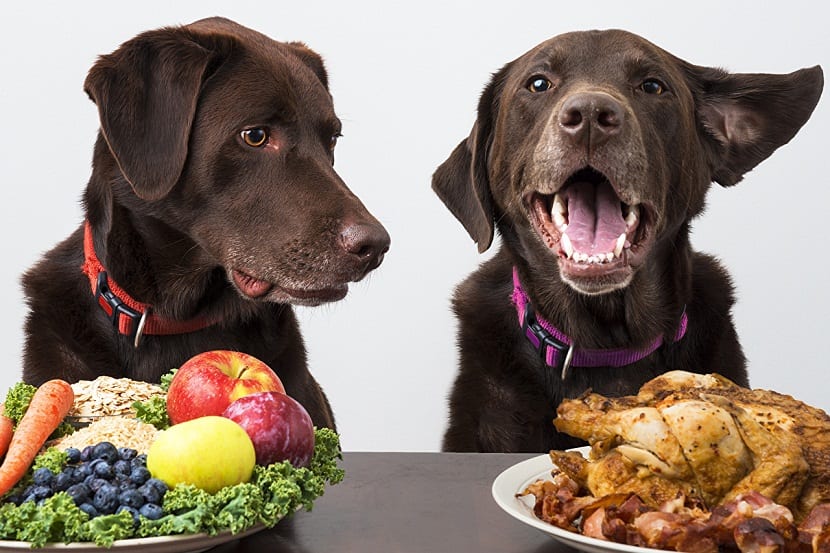
Veterinarians consider that fruits and vegetables are essential for pets, especially for dogs. However, this does not mean that they need to eat too much of these two types of foods, it means that fruit and vegetables should be part of the dog's diet, especially since many dogs have the pleasure of eating it.
As you already know, fruits and vegetables have a rich content of minerals and vitamins that ensure the health of the dog.
Why should your dog eat fruits and vegetables?

Because they contain vitamin B, C, K, citric acid, tartaric acid, malic acid, potassium, phosphorus, magnesium, folic acid, carotene, iron and other mineral salts.
These foods are a great source of nutrients that help nourish the body and keep your dog healthy. Many of those are effective in elimination of toxins from the body, have anti-inflammatory, antibacterial properties and help lower cholesterol. In this way, the dog maintains a good state of health since fruits and vegetables strengthen immunity, increase the body's resistance against diseases and against toxins that accumulate in the body.
What are the fruits and vegetables that our dog can eat?
All the most important fruits and vegetables that should be introduced into your dog's diet are spinach, carrots, beets, watercress, cabbage, pumpkin, tomatoes, zucchini, cucumbers, peppers, turnips, parsley, dill, strawberries, apples, pineapples, bananas, raspberries, red currants .
Vegetables such as carrots, squash and beets are boiled and easily eaten by your dog should be mixed with your daily food (rice or rolled oats). These fruits and vegetables improve the dog's digestion, strengthen the immune system, help maintain dental hygiene (if eaten raw) and also help the dog avoid constipation and anemia.
Apples contain vitamin C, potassium, pectin, iron, phosphorus, calcium, fructose and sodium, bananas have numerous vitamins, magnesium, calcium, zinc and potassium, which help fight diarrhea, apricots are rich in carotene, folic acid, minerals, trace elements and vitamins, pineapple due to its high acidity, must be given in small amounts and strawberries have vitamins and minerals that are important for the animal have healthier coat and improve concentration.
Citrus fruits are not recommended in large quantities because they are acidic, but they help the body purify the blood, strengthen the immune system, and lower blood pressure. Ripe peaches stimulate digestion, purify the kidneys of toxins, purify the blood and normalize the metabolism.

Broccoli is important for your dog's health, but it can cause bloating and is that as you already know, broccoli is a great source of sulforaphane, calcium, vitamins (C and B), carotene, potassium, selenium, iron and sodium, even cauliflower can also cause inflammation, but it is a source of vitamin C, calcium, potassium, and folate.
Potatoes are only recommended boiled, since offer energy to our dogThey contain protein, starch, starch, potassium, vitamins (A, B, C), sodium, fiber, phosphorus, calcium and iron. Spinach leaves (stemless) contain enzymes, more than 10 vitamins and minerals, beta-carotene, and protein.
Dogs love carrots as these are very healthyAlthough some dogs prefer boiled carrots over raw ones.
Beets are important for your dog's health because stimulates appetite, regulates digestion and prevents the appearance of many diseases and it is that this is recommended boiled, since it contains folic acid, vitamins, minerals, flavonoids and saponins.
A recommendation, do not put so much salt in your dog's food, because the dog needs less salt than a person. Vegetables can be cut into pieces or grated to add to food, can be used raw or cooked according to your dog's preferences.